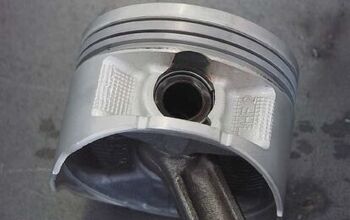Piston Slap: Driver's Ed Gets Piston Slapped

TTAC Commentator edgett writes:
What is the correlation between driver’s training and safety? Articles suggest that improved driver training does not improve highway safety are simply counterintuitive. Granted that nothing supplants experience on the road, but surely having some idea of the braking and handling characteristics of your vehicle, before “experience” requires it, is of more than passing value. And how can we expect someone who is competent to drive a Honda Civic to drive competently when put behind the wheel of a Suburban or 15 passenger van?
If the Air Force ensures that pilots start off in small, light single-seat aircraft and lots of simulator time before getting a seat in an F15, doesn’t this suggest that education is worthwhile? This one has been hinted at in a variety of posts, but I don’t recall seeing anything where the issue has been covered in depth.
Like you, I can’t digest the “no correlation between driver training and on-road safety” argument. Unfortunately, given the time and research confines of Piston Slap, I cannot find information that is a slam-dunk rebuttal for our case.
But, with the Best and Brightest’s input, I suspect we have an ace up our sleeve: research the automobile accident and morality rates in a country with extensive driver training and compare their numbers to that of the USA. I’ve heard that Germany has a somewhat rigorous test before handing out licenses, so that’s where I’d start.
Then again, there’s an argument for any multi-nation analysis being irrelevant, as American roads, speeds, and automobiles are quite different. How many Ford Fiestas in Europe travel at the speed (and distance) of a Chevy Suburban in the Midwest? Close to none.
Bonus! A Piston Slap Nugget of Wisdom:
My beef with this debate regards what everyone overlooks: wear and tear items and their effect on vehicle performance. Used up brake pads/rotors/fluid quickly negates any benefits to smart drivers or anti-lock brakes. Yaw-sensing handling nannies are no substitute for replacing your bald-ass tires. Even most (halogen) headlights lose their “focus” after 4+ years on the road.
I personally saw the problem on a wet and twisty four-lane road with no median. A blue Kia sedan obviously lost control and wound up upside down after hitting oncoming traffic. The local news later reported this incident as a fatality, and the police officer on tape made it a point to show the Kia’s bald rear tires. Was saving $200-300 worth that person’s life?
I suspect this is not an isolated incident. Count all the accidents where the vehicles in question had out-of-spec wear items and the percentages shall blow your mind.
[Send your queries to mehta@ttac.com]

More by Sajeev Mehta
Latest Car Reviews
Read moreLatest Product Reviews
Read moreRecent Comments
- Legacygt It was more than 20 years ago that the Bangle designed BMW sedans started looking a little bit awkward. But the lineup today is chock full of downright ugly vehicles. This is one of them.
- Jeff It does state in this article that Europeans as well as Americans have cooled on EVs. I can see push back from consumers on the 2035 deadline for EVs in Europe and in states like California. I have no problem with manufacturers offering EVs but many for at least now don't want EVs. Maybe GM instead of planning to do away with the Malibu to make more EVs should have offered the Malibu as only a hybrid like Toyota is offering the Camry for 2025. It would cost GM a lot less to offer a hybrid Malibu and it would outsell any EV that plant would produce. I even think GM would increase sales of the Malibu as a hybrid only and more competitive pricing.
- Kwik_Shift_Pro4X I fell asleep looking at that image.
- Verbal Rented a Malibu a while back. It was fine, if a bit gutless.I get that Detroit wants to go all-in on high profit margin SUVs and blinged-out MAGA trucks. Everyone has known for decades that they can't compete on price in the affordable sedan space. So now all of Detroit's sedans are gone except for a couple of Cadillac models.But you'd think that just one of the domestic brands could produce a fun, competitive and affordable sedan. Just one? Please? Anyone? Bueller?
- 3-On-The-Tree I wouldn’t even use Ford as a hearse for fear of being late to my party.


































Comments
Join the conversation
It seems to me that the number one cause to accidents is attitude. Indifference? Anger? Inattention? Distraction? Arrogance? Suicidal? Rage? Immaturity? All play a part. And you can't train that out. I'm noticing a much higher incidence of the "road rage" type of accidents, though to be frank, calling them accidents is not really honest. Unpremeditated attacks? As the roads get more overloaded the stress rises. Bad traffic management leads to more risky behaviour as people try to "beat" the rest to a goal. Fenderbenders abound. Speed increases. Stupid behaviours become more commonplace and as is the usual case, familiarity breeds contempt and as each incidence that occurs with nothing of consequence happening it leads to further risky manoevers until it's become the unthinkable. Look at the youtube follies. Risky and stupid behaviours abound. Yes, some of the most spectacular happen in badly traffic/road designed countries like China, Russia and Eastern Europe but that's no excuse for all the others. And that's not a training issue. Is it an enforcement issue? Perhaps. Given how overwhelmingly prevalent it is, that's not a likely solution. There's just not enough cops in the world to put a stop to it. Unfortunately I have no answers today.
This point has been made in other articles and above with the MSF: continuous training is required to see any long term results. But this will eventually be a moot point when computers drive us around. It's coming.